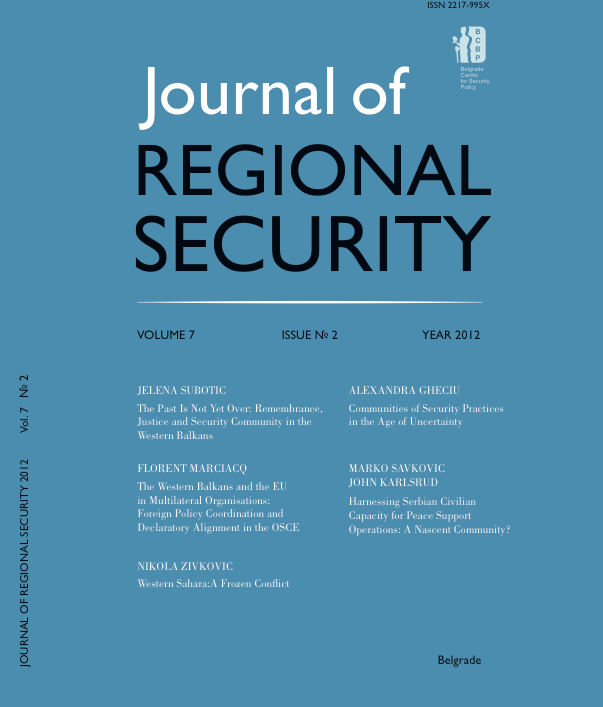The Western Balkans and the EU in Multilateral Organisations: Foreign Policy Coordination and Declaratory Alignment in the OSCE
Sažetak
This paper sheds light on the Europeanisation of Western Balkan states’ multilateral diplomacy in the Organisation for Security and Cooperation in Europe (OSCE). More specifically, it enquires into the politics of declaratory alignment of six Western Balkan states. It analyses the frequency at which those states have aligned themselves with the statements of the European Union (EU) between 2004 and 2011, and researches qualitatively the motives of their alignment. The paper finds that the declaratory behaviour of most Western Balkan states in the OSCE has become distinctively convergent with EU positions. Although conditionality certainly fosters alignment, the paper shows that socialisation is a more powerful mechanism of diffusion for most Western Balkan states; that emulation should not be neglected amongst small-sized countries; and that coercion and, interestingly, persuasion do not play a significant role.
Reference
Börzel, Tanja A., and Thomas Risse. 2000. “When Europe Hits Home: Europeanization and Domestic Change.” European Integration online Papers 4 (14).
Börzel, Tanja A., and Thomas Risse. 2009. “The Transformative Power of Europe: The European Union and the Diffusion of Ideas.” KFG Working Paper Series. Berlin: Freie Universität Berlin.
Buller, Jim, and Andrew Gamble. 2002. “Conceptualising Europeanisation.” Public Policy and Administration 17 (2): 4–24.
Featherstone, Kevin. 2003. “Introduction: In the Name of ‘Europe’”. In The Politics of Europeanization, edited by K. Featherstone and C. M. Radaelli, 3–26. Oxford; New York: Oxford University Press.
Green Cowles, Maria, James A. Caporaso, and Thomas Risse-Kappen, eds. 2001. Transforming Europe: Europeanization and domestic change. Ithaca: Cornell University Press.
Holzinger, Katharina, and Christoph Knill. 2005. “Causes and conditions of cross- national policy convergence.” Journal of European Public Policy 12 (5): 775–96.
Jørgensen, Knud Erik. 2004. “European Foreign Policy: Conceptualising the Domain.” In Contemporary European Foreign Policy, edited by W. Carlsnaes, H. Sjursen and B. White, 32–56. London; Thousand Oaks: Sage.
Knill, Christoph. 2005. “Introduction: Cross-national policy convergence: concepts, approaches and explanatory factors.” Journal of European Public Policy 12 (5): 765– 74.
Marciacq, Florent. 2011. “Foreign policy coordination and diplomatic alignment in the OSCE: Differential patterns of Europeanisation in non EU-Europe.” Paper presented at the 6th ECPR General Conference, August 25-27th, Reykjavik, Iceland.
Marciacq, Florent. 2012. “Europeanisation at work in the Western Balkans and the Black Sea Region: Is there an all-European way of voting in the United Nations General Assembly?” Perspectives on European Politics and Society 13 (2): 169–86.
Radaelli, Claudio M., and Romain Pasquier. 2007. “Conceptual Issues.” In Europeanization: New Research Agendas, edited by P. Graziano and M. P. Vink, 35– 45. Houndmills; New York: Palgrave Macmillan.
Risse, Thomas, Maria Green Cowles, and James A. Caporaso. 2001. “Europeanization and Domestic Change: Introduction.” In Transforming Europe: Europeanization and domestic change, edited by M. Green Cowles, J. A. Caporaso and T. Risse-Kappen, 1–20. Ithaca: Cornell University Press.
Smith, Michael E. 2000. “Conforming to Europe: the domestic impact of EU foreign policy co-operation.” Journal of European Public Policy 7 (4):613–31.
Smits, Jan M. 2004. “The Europeanisation of national legal systems: some consequences for legal thinking in civil law countries.” In Epistemology and Methodology of Comparative Law, edited by M. van Hoecke, 229–45. Oxford: Hart Publishing.”
Authors retain copyright of the published papers and grant to the publisher the non-exclusive right to publish the article, to be cited as its original publisher in case of reuse, and to distribute it in all forms and media.
The published articles will be distributed under the Creative Commons Attribution 4.0 International License (CC BY). It is allowed to copy and redistribute the material in any medium or format, and remix, transform, and build upon it for any purpose, even commercially, as long as appropriate credit is given to the original author(s), a link to the license is provided and it is indicated if changes were made. / The published articles will be distributed under the Creative Commons Attribution ShareAlike 4.0 International license (CC BY-SA). It is allowed to copy and redistribute the material in any medium or format, and remix, transform, and build upon it for any purpose, even commercially, as long as appropriate credit is given to the original author(s), a link to the license is provided, it is indicated if changes were made and the new work is distributed under the same license as the original.
Users are required to provide full bibliographic description of the original publication (authors, article title, journal title, volume, issue, pages), as well as its DOI code. In electronic publishing, users are also required to link the content with both the original article published in Journal of Regional Security and the licence used.
Authors are able to enter into separate, additional contractual arrangements for the non-exclusive distribution of the journal's published version of the work (e.g., post it to an institutional repository or publish it in a book), with an acknowledgement of its initial publication in this journal.
Authors are permitted to deposit author’s pre-print / author’s post-print (accepted version) / publisher's version (PDF) of their work in an institutional repository, subject-based repository, author's personal website (including social networking sites, such as ResearchGate, Academia.edu, etc.), and/or departmental website prior or during the submission process / at any time after the acceptance of the manuscript / at any time after publication.
Full bibliographic information (authors, article title, journal title, volume, issue, pages) about the original publication must be provided and links must be made to the article's DOI and the license.

